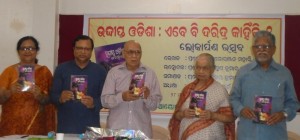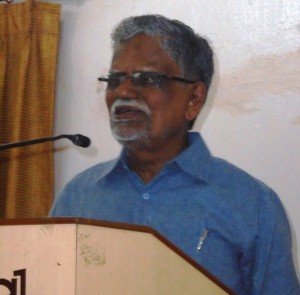 Awaited particularly in the activists as well as the literary fraternity, the book ‘Uddeepta Odisha, Ebe Bi Daridra Kahinki?’ by Professor Manoranjan Mohanty was released in Lohia Academy, Bhubaneswar on 28th of March 2015. Prof Mohanty is a renowned Professor in Delhi University. The book release function was organized by the Gabeshana Chakra, Bhubaneswar of which Prof Mohanty was himself the founding member.
Awaited particularly in the activists as well as the literary fraternity, the book ‘Uddeepta Odisha, Ebe Bi Daridra Kahinki?’ by Professor Manoranjan Mohanty was released in Lohia Academy, Bhubaneswar on 28th of March 2015. Prof Mohanty is a renowned Professor in Delhi University. The book release function was organized by the Gabeshana Chakra, Bhubaneswar of which Prof Mohanty was himself the founding member.
The book was released by famous anthropologist and former Vice Chancellor of Utkal and Sambalpur Universities, Prof Laxman Kumar Mohapatra. Also present alongside him were the President and General Secretary of the Gabeshana Chakra, Prof Bijaya Kumar Bohidar and Prof Geetanjali Dash. Noted author and social worker, Dr Saraswati Swain, acted as the Chairperson of the function.
Activists like Sudhir Pattnaik (Samadrusti), Sandeep Pattnaik (NCAS), Manohar Chauhan (CSD, Odisha) and President of Bargarh Krushak Sangh, Lingaraj, were present on the occasion. Economist Golak Behari Nath and famous organic farmer, Natwar Sarangi were also part of the audience.
Keeping in spirit of the book, the function opened with an Odia revolutionary song, the lines of which go as-
Friends, let’s move towards freedom; our blood will flow but still we won’t waive from our goal;
We have taken birth for revolution and shall die for the same……….
 Professor Manoranjan Mohanty said that the book is centred on the question — that even though Odisha is awake and there are many social movements, why is it that the magnitude of poverty and under-development is still so high. “There is still persistence of colonial interests and extractive economy is at work. Odisha is the source of cheap labour and resources. The age of globalization has brought more focus into this aspect. There are more mineral based Industries and Odisha provides the raw materials without its poor people getting any benefits. All protests are muted with repression and force. The Govt’s strategy is just to calm the activists temporarily without deriving any concrete solution to any of the problems’’, said Prof Mohanty. He asked all activists to reform their ‘chintan’ (thinking) to counter the present trend.
Professor Manoranjan Mohanty said that the book is centred on the question — that even though Odisha is awake and there are many social movements, why is it that the magnitude of poverty and under-development is still so high. “There is still persistence of colonial interests and extractive economy is at work. Odisha is the source of cheap labour and resources. The age of globalization has brought more focus into this aspect. There are more mineral based Industries and Odisha provides the raw materials without its poor people getting any benefits. All protests are muted with repression and force. The Govt’s strategy is just to calm the activists temporarily without deriving any concrete solution to any of the problems’’, said Prof Mohanty. He asked all activists to reform their ‘chintan’ (thinking) to counter the present trend.
President of Gabeshana Chakra, Prof Bijaya Kumar Bohidar, reviewed the book. He said that the book deals with the rich creative culture in Odisha and how it has been stunted. “The Book says that the mental and intellectual development is not possible in the present prevailing situation in the state. Justice and welfare are both missing. Putting everything aside, the urge to protest the system comes naturally as there is no way out. Development has happened, not for the poor but the benefits have gone to only a small cluster of people. The small clan of capitalists in the country who are in cahoots with the western capitalists are narrow minded and they want to corner all the gains for themselves at the cost of the poor, deprived people of the State, says the Book. There is a clear nexus between the capitalist class and the Govt. We have only learnt to ape and copy in all these years of Independence. We have lost the power to think and create. As all the benefits for development are enjoyed by the elite upper class and the upper middle class, nothing trickles down to the poor. This is reason for huge migration out of the State, states the Book. The book tries to instigate a fresh intellectual development. It urges a political bend to the revolution. The best part of the book is that apart from deep analysis of the problems, the Book also tries to put up a roadmap.” said Prof Bohidar in his review. “The book is like a medicine. It will not only motivate us but will also motivate the youth greatly’’, opined Prof Bohidar on his own
The whole event was moderated by Prof Geetanjali Dash, the GS of Gabeshana Chakra. Around 100 people, mostly drawn from the fraternity of activists, academicians, writers and the media, were present at the function.
